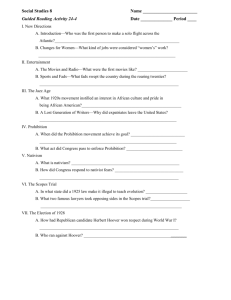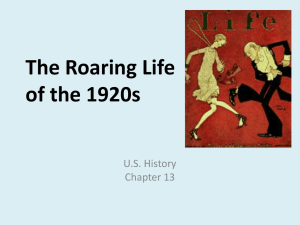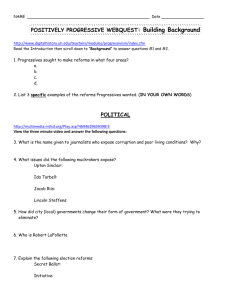Progressive Era
advertisement
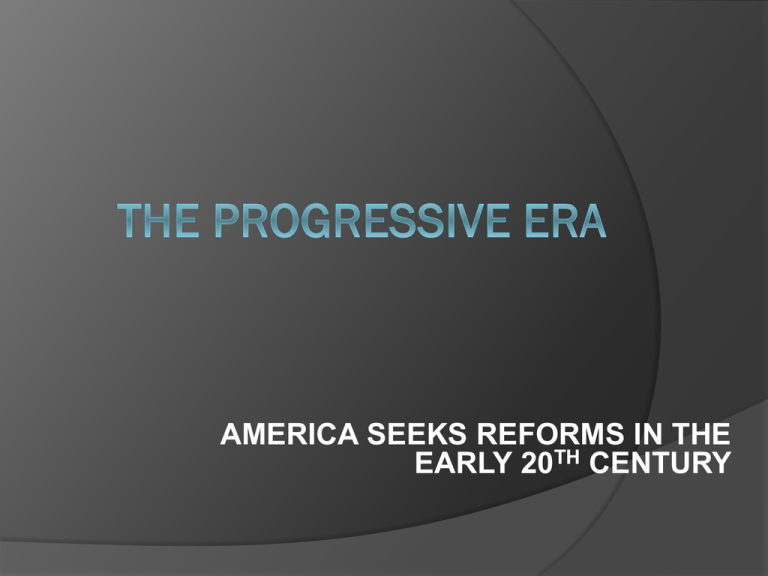
AMERICA SEEKS REFORMS IN THE EARLY 20TH CENTURY Origins of Progressivism Middle class reformers addressed social problems Issues: Working conditions, rights for women and children, economic, political, environmental and social reform Progressive Ideology Accepted industrial capitalism Faith in progress; optimism Belief in use of govt. to reform society Use of Evangelical Protestantism Faith in New Ideas and Science Power of experts Four Goals of Progressivism Protect Social Welfare 2. Promote Moral Improvement 3. Create Economic Reform 4. Foster Efficiency 1. 1. Protect Social Welfare Industrialization largely unregulated Employers felt little responsibility toward workers Settlement homes & churches serve community YMCA, YWCA & Salvation Army take service roles 2. Promote Moral Development Social problems caused by personal behavior Proposed prohibition Clash of science & religion 3. Create Economic Reform Americans question the capitalist economic system Workers embrace socialism Eugene Debs organized the American Socialist Party in 1901 Debs encouraged workers to reject American Capitalism 4. Fostering Efficiency Political leaders start government & electoral reforms to improve efficiency Industrial leader Frederick Taylor using time & motion studies to improve factory efficiency Taylorism became an Industry fad – factories complete tasks quickly Social Welfare Women Lead Reforms Leading progressive reformers were women Women reformers improve conditions at work & home Many women graduated from new women’s colleges Colleges like Vassar and Smith allowed women to excel Social Welfare Women in the Workforce Women w/o education did domestic work 70% of women servants in 1870 Opportunities for women increased in the cities 1900: 1 out of 5 women worked Garment trade, office work, department stores and classrooms had women Social Welfare Strategy for Suffrage Suffragists tried three approaches for suffrage: 1. State legislatures to adopt vote (Succeeded in Wyoming, Utah, Idaho, Colorado) 2. Challenge the 14th Amendment 3. Push for Constitutional Amendment Social Welfare Women Win Suffrage Native-born, educated, middle-class women grew more and more impatient Local, state and national organizations, protests and World War I, women finally get the vote in 1920 The 19th Amendment gave women the right to vote in 1920 Social Welfare NAACP & Civil Rights 1909: National Association for the Advancement of Colored People founded Goal: full equality among the races Means: legal action 1964 Application Social Welfare New Roles for Women Early 20th Century teachers Many are now nurses, teachers, librarians, & secretaries Women still earned less than men & kept out of many traditional male jobs Social Welfare The Flapper New female ideal for some women: the Flapper Flapper: an emancipated young woman who embraced the new fashions and urban attitudes Social Welfare The Changing Family Margaret Sanger and other founders of the American Birth Control League - 1921 Birthrates decline for years before the 1920s Birth control information widely available 1921: Birth control clinics opened & American Birth Control League founded Social Welfare Modern Family Marriage based on romantic love Women manage household and finances Children developing who need nurturing and education Moral Development Support for Prohibition Belief that alcohol led to crime, child & wife abuse, and accidents Supporters from the rural south and west Church affiliated AntiSaloon League & Women’s Christian Temperance Union push for the 18th Amendment Moral Development Americans Speakeasies & Bootleggers did not believe drinking was a sin Immigrants not willing to give up drinking Drinkers went to hidden saloons - speakeasies People bought liquor from bootleggers Moral Development Organized Crime Prohibition contributed to the growth of organized crime Al Capone – famous bootlegger Capone controls Chicago liquor business by killing his competition Al Capone was finally convicted on tax evasion charges in 1931 Moral Development Government Control Government doesn’t budget money to enforce law Enforcing Prohibition fell to 1,500 poorly paid federal agents --- clearly an impossible task Federal agents pour wine down a sewer Moral Development Prohibition Repealed Mid-20s 19% of Americans supported Prohibition Many felt Prohibition caused more problems than it solved 1933: 21st Amendment repeals Prohibition Moral Development Science & Religion Clash Battle b/w fundamentalist religious groups & secular thinkers Fundamentalists found literal truth in the bible Moral Development Scopes Trial 1925, Tennessee passes a law making criminalizing evolution in schools ACLU promises to defend any teacher who challenges the law: John Scopes Scopes was a biology teacher who dared to teach his students that man derived from lower species Moral Development Scopes Trial Darrow ACLU hires Clarence Darrow, most famous trial lawyer of the era, for Scopes Prosecution hires William Jennings Bryan, the 3-time presidential nominee Bryan Moral Development Scopes Trial Opens on July 10,1925 Darrow calls Bryan as a Bible expert: Should the bible be interpreted literally? Bryan admits the Bible can be interpreted in different ways Scopes still was found guilty and fined $100 Bryan Darrow Economic Efficiency Criticizing Big Business “Muckrakers” exposed corruption in business Ida Tarbell exposed Standard Oil Company’s cut-throat methods of eliminating competition Michael Moore? Ida Tarbell Some view Michael Moore as a modern muckraker Economic Efficiency “The Jungle” Leads to Reforms 1906: Roosevelt pushed for the Meat Inspection Act after reading The Jungle by Upton Sinclair The Act mandates clean meatpacking plants Economic Efficiency Protecting Working Children As the number of child workers rose, reformers worked to end child labor Children more accident prone Nearly every state banned child labor by 1918 Economic Efficiency Limiting Working Hours Supreme Court enacted or strengthened laws reducing worker hours Progressives also won worker’s compensation Economic Efficiency Triangle Shirtwaist Fire Political Efficiency Cleaning Up Government Desire to make government more efficient & responsive to citizens Some believe it also was meant to limit immigrants influence in local governments Political Efficiency Tom Reform Mayors L. Johnson, Cleveland, OH Expanded social services and brought about public ownership of the waterworks, gas and electric utilities, and public transportation Samuel “Golden Rule” Jones, Toledo, OH Provided free social services and reformed the police department Hazen S. Pingree, Detroit, MI Expanded public welfare programs, initiated public works programs for the unemployed, and fought privately owned utility monopolies. Political Efficiency Election Reforms Won secret ballots, referendum votes, and the recall Could petition and get initiatives on the ballot Political Efficiency Election Reforms Each state assembly chose U.S. senators Force senators to be more responsive to the public popular election of senators was pushed 1913: 17th Amendment ratified for direct election of Senators Progressive Presidents & Laws Roosevelt establishes himself as a modern president Wilson enacts his “New Freedom” Planned to attack privilege: trusts, tariffs, and high finance 1902 Coal Strike PA coal miners strike for increased wages, a 9-hour work day, and the right to unionize Management refuse to bargain Roosevelt settled the dispute Precedent: when strikes threaten public welfare federal government expected to step in Pure Food & Drug Act 1906: passage of the Pure Food and Drug Act Act halts sale of contaminated foods and medicines and called for truth in labeling The Pure Food and Drug Act took medicines with cocaine and other harmful ingredients off the market Clayton Antitrust Act 1914: passage of the Clayton Antitrust Act strengthens the Sherman Act Clayton Act prevents companies from buying stock from other companies antimonopoly Act supported unions Federal Trade Commission 1914: FTC serves as “watchdog” agency – end unfair business practices The FTC protects consumers from business fraud Today the FTC has been working on protecting consumers from ID theft Federal Income Tax 1913: 16th Amendment ratified legalizing a graduated federal income tax Progressive Movement Wanes Progressive movement peaks by 1917 Success of the movement led to its decline Advent of World War I also hurt progressive activism Progressives themselves weary of their reform zeal; as did the nation

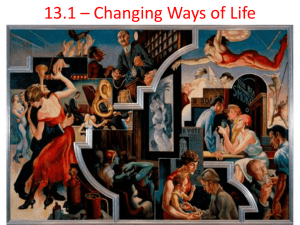
![Changes%20in%20American%20Society[1] - pams](http://s3.studylib.net/store/data/009097112_1-9a8e74b6b539401fd3776a36445a3f2f-300x300.png)

